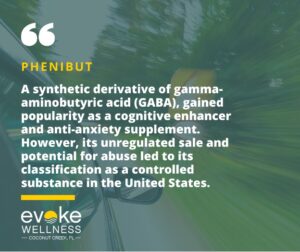You’ve likely heard of phenibut and may wonder about its safety and effectiveness. As an unregulated supplement, phenibut poses real risks. This comprehensive guide details phenibut’s history, intended uses, side effects, and dangers. You’ll learn key statistics on phenibut use and abuse. Discover when phenibut may be appropriate and examine safer alternatives. Stay informed on this controversial substance and protect your health and wellbeing. Heed the science-based guidance to avoid phenibut’s pitfalls.
If you or a loved one is struggling, help is available today. Call (833) 969-3318 to speak with our compassionate team, or reach out online and schedule an appointment to begin a healing journey.
What Is Phenibut?
A Russian Nootropic
Phenibut is a synthetic derivative of gamma-Aminobutyric acid (GABA), developed in Russia in the 1960s. Originally marketed as a brain-boosting “nootropic” and anti-anxiety medication, it acts as a GABA receptor agonist in the brain.
Mechanism of Action
- Stimulates GABA receptors
- Reduces anxiety and stress
- Promotes relaxation and sleep
Despite initial use for medical purposes, phenibut is now an unregulated supplement available online. Its effects are similar to benzodiazepines, although potentially stronger and longer-lasting.
Abuse Potential
With continued use, tolerance and dependence can develop rapidly. Quitting can lead to severe withdrawal symptoms like anxiety, insomnia, and psychosis – underscoring phenibut’s high abuse liability. While it may boost mood and cognition initially, phenibut carries serious risks of addiction and adverse effects with recreational misuse.
Help is available
- Prescription drug rehab program
- Drug rehab program
- Relapse prevention therapy program
- Residential treatment program
The History of Phenibut
Origins in Russia
Phenibut, or β-Phenyl-γ-aminobutyric acid, was first synthesized in Russia in the 1960s. Initially developed as a Soviet-era neuropsychotropic drug to treat anxiety, insomnia, and other neurological conditions.
Rise in Recreational Use
In the 1990s, phenibut began gaining popularity as a cognitive enhancer and recreational drug in the underground bodybuilding and nootropic communities. It was touted for its anti-anxiety, mood-boosting, and neuroprotective properties.
Unregulated Supplement
While regulated as a prescription medication in Russia, phenibut remains uncontrolled in most countries. This allows it to be marketed as an unregulated supplement or “smart drug” online and in certain stores.
- Lack of research on long-term effects
- Easy access fuels abuse potential
- Calls for tighter regulations
Why Is Phenibut Banned in the US?
Lack of Oversight
As an unregulated supplement, phenibut’s manufacturing, labeling, and distribution evaded strict quality control measures. This raised concerns over its purity, potency, and potential health risks.
Abuse Potential
Phenibut’s ability to cross the blood-brain barrier and mimic GABA’s inhibitory effects made it prone to misuse. Long-term use or high doses could lead to tolerance, dependence, and withdrawal symptoms resembling alcohol or benzodiazepine withdrawal.
Safety Concerns
Reports of adverse effects, including dizziness, nausea, and respiratory depression, highlighted phenibut’s potential dangers, especially when combined with other depressants or consumed by vulnerable populations.
To safeguard public health, the Drug Enforcement Administration (DEA) classified phenibut as a Schedule IV controlled substance in 2019, effectively banning its sale and possession without a prescription.
How Phenibut Affects the Brain
Phenibut works by interacting with GABA receptors in the brain. GABA is an inhibitory neurotransmitter that helps reduce neuronal excitability and promote relaxation.
GABA Receptor Binding
- Binds to GABA-B receptors and GABA-A receptors
- Enhances GABA transmission and activity
Increased GABA signaling leads to several effects:
Sedation and Relaxation
- Reduces anxiety, promotes calmness
- Sedative, sleep-promoting properties
Lowered Neuronal Excitability
- Dampens excessive neuronal firing
- Anti-convulsant, anti-seizure effects
Muscle Relaxation
- Reduces muscle tension and spasticity
- Treats conditions like restless legs syndrome
While phenibut can provide benefits, its effects on GABA signaling also carry risks of dependence and withdrawal when stopped abruptly. Moderation is key to avoid adverse reactions related to GABA system dysregulation.
The Dangers and Side Effects of Phenibut
Addiction Potential
- Short-term use can quickly lead to dependence and addiction.
- Withdrawal symptoms like anxiety, insomnia and tremors occur after stopping.
Physical Effects
- Dizziness, nausea and loss of appetite are common side effects.
- Overdosing can cause vomiting, delusions, loss of consciousness and even death.
Mental Health Risks
- Phenibut depresses the central nervous system, impairing cognition.
- It can worsen anxiety, depression and psychosis in high doses or with prolonged use.
Combining with Other Substances
- Mixing phenibut with alcohol, benzodiazepines or opioids greatly increases overdose risk.
- This dangerous combination can lead to respiratory depression and death.
With a high potential for addiction and serious side effects, phenibut poses significant dangers – especially when combined with other depressants. Be extremely cautious with this powerful substance.
Phenibut Overdose and Withdrawal
Overdose Risks
An overdose of phenibut can lead to severe respiratory depression, coma, and even death. The risk increases when combined with other depressants like alcohol or benzodiazepines.
Withdrawal Symptoms
Abruptly stopping phenibut after developing dependence can trigger intense withdrawal effects. These may include anxiety, insomnia, tremors, psychosis, and potentially life-threatening seizures.
Seek medical help to safely taper off under supervision. Inpatient detox and residential treatment programs provide the support needed to quit phenibut safely.
Getting Help for Phenibut Addiction
If you’re struggling with phenibut addiction, it’s crucial to seek professional help. Trying to quit on your own can be extremely difficult and even dangerous due to the severe withdrawal symptoms associated with this substance.
Inpatient Rehab Programs
One effective option is an inpatient or residential treatment program. These provide a safe, structured environment where you can detox under medical supervision and receive comprehensive therapy to address the root causes of your addiction.
Outpatient Treatment
If inpatient rehab isn’t feasible, outpatient programs allow you to live at home while attending regular counseling sessions and support group meetings. Look for programs specializing in prescription drug rehab with relapse prevention therapy.
Support Groups
In addition to professional treatment, joining a support group can provide invaluable encouragement and advice from others who understand what you’re going through. Groups like Phenibut Addiction Support offer a judgment-free space to share your struggles and successes.
Overcoming phenibut dependence takes incredible strength, but you don’t have to go it alone. Reach out for help today to start your journey towards recovery and lasting sobriety.
Conclusion
You now have a comprehensive understanding of the history, uses, and dangers of phenibut. While it may seem like an appealing supplement, the risks of dependence and severe withdrawal make it too hazardous for most people. Consider safer alternatives and talk to your doctor if you’re struggling with anxiety, insomnia or pain. Your wellbeing is too precious to put at risk with an unregulated substance. You have the power to make informed, healthy choices. Trust yourself and stay strong through life’s challenges, knowing there are better solutions than phenibut. You deserve to live fully and fearlessly. With courage and self-love, you can build the life you envision, phenibut-free.
Begin Your Journey With Evoke Wellness at Coconut Creek
Evoke Wellness at Coconut Creek is a full-service addiction and Mental Health treatment facility serving Florida residents. We base each of our programs on the individual’s severity of symptoms and use a combination of evidence-based therapies and holistic approaches to address the needs and recovery goals of the patient.
If you or a loved one is struggling, help is available today. Call (833) 969-3318 to speak with our compassionate team, or reach out online and schedule an appointment to begin a healing journey.



